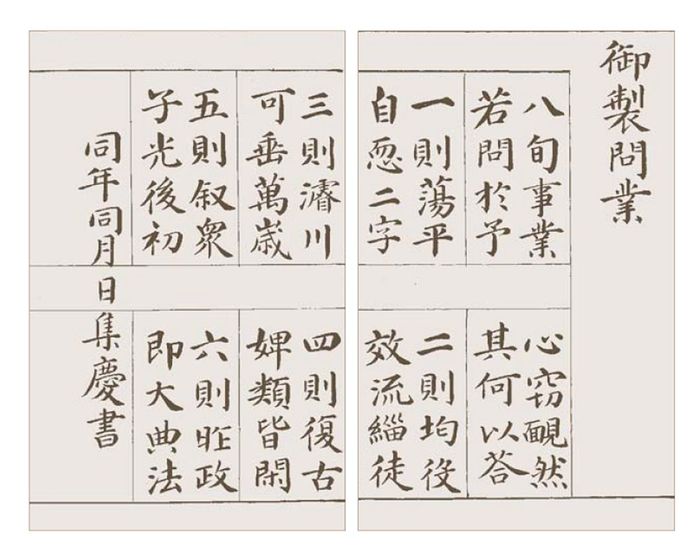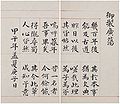"(Translation) 御製問業"의 두 판 사이의 차이
장서각위키
(→Translation) |
|||
| (사용자 3명의 중간 판 11개는 보이지 않습니다) | |||
| 5번째 줄: | 5번째 줄: | ||
|Korean = 어제문업(''Eoje munup'') | |Korean = 어제문업(''Eoje munup'') | ||
|Genre = [[Royal Documents]] | |Genre = [[Royal Documents]] | ||
| − | |||
|Author = [https://en.wikipedia.org/wiki/Yeongjo_of_Joseon King Yeongjo] | |Author = [https://en.wikipedia.org/wiki/Yeongjo_of_Joseon King Yeongjo] | ||
|Year = 1774 | |Year = 1774 | ||
| 28번째 줄: | 27번째 줄: | ||
=='''Original Script'''== | =='''Original Script'''== | ||
| − | {|class="wikitable" style="width:80%; background-color:#ffffff;" | + | {|class="wikitable" style="width:80%; font-size:110%; color:#002080; background-color:#ffffff;" |
!style="width:40%;"|Classical Chinese || style="width:60%;"| English | !style="width:40%;"|Classical Chinese || style="width:60%;"| English | ||
|- | |- | ||
| 56번째 줄: | 55번째 줄: | ||
|} | |} | ||
| − | ==''' | + | <!-- |
| + | =='''Discussion Questions'''== | ||
| + | # | ||
| + | # | ||
| − | |||
| − | |||
| − | |||
| + | =='''Further Readings'''== | ||
| + | <div style="color:#008080;"> | ||
| + | * View together with '''[http://kadhlab103.com/wiki/index.php/어제경민음 (Korean text) King Yeongjo’s Admonition for the People” (Eoje gyeongmineum 御製警民音, 1762)]''' | ||
| + | * View together with '''[[정조 윤음 번역|(Translation) King Jeongjo, “Royal dictum to encourage farming” (Gweonnong yuneum 勸農綸音, 1781)]]''' | ||
| + | </div> | ||
| + | =='''References'''== | ||
| + | <references/> | ||
| − | + | =='''Translation'''== | |
| − | |||
| − | |||
==='''Student 1 : Kim Young'''=== | ==='''Student 1 : Kim Young'''=== | ||
| 186번째 줄: | 190번째 줄: | ||
Written at the Chipkyong Hall. | Written at the Chipkyong Hall. | ||
| − | *Discussion Question: In the mainstream narrative of Korean history, King Yongjo has been considered as the most Confucian ruler throughout the Choson dynasty. In this sense, it seems a bit extraordinary that he indeed endeavored to decrease the burden of taxation for female members of the population (albeit following the Chinese model). Then, would it be possible to reevaluate Yongjo as a relatively feminist monarch of the Choson dynasty in conjunction with the texts we dealt with today? | + | *Discussion Question: |
| + | In the mainstream narrative of Korean history, King Yongjo has been considered as the most Confucian ruler throughout the Choson dynasty. In this sense, it seems a bit extraordinary that he indeed endeavored to decrease the burden of taxation for female members of the population (albeit following the Chinese model). Then, would it be possible to reevaluate Yongjo as a relatively feminist monarch of the Choson dynasty in conjunction with the texts we dealt with today? | ||
==='''Student 6 : Hu Jing'''=== | ==='''Student 6 : Hu Jing'''=== | ||
| 208번째 줄: | 213번째 줄: | ||
Royal Writing of King Yongjo's Reflection on His Governance. | Royal Writing of King Yongjo's Reflection on His Governance. | ||
| − | After living for 80 years, if someone asks about my reflection upon my governance, I feel deeply | + | After living for 80 years, if someone asks about my reflection upon my governance, I feel deeply embarrassed. How can I respond that? |
| − | First, I implemented the policy of "Magnificant Harmony"*1 but it was neither magnificent nor harmonious. | + | First, I implemented the policy of "Magnificant Harmony"*1 but I am ashamed that it was neither magnificent nor harmonious. |
Second, I equalized taxation and corvee labor. It was so effective that it even benefitted Buddhist monks. | Second, I equalized taxation and corvee labor. It was so effective that it even benefitted Buddhist monks. | ||
Third, I dredged the river, so that it can serve people for many years. | Third, I dredged the river, so that it can serve people for many years. | ||
| 294번째 줄: | 299번째 줄: | ||
1. Who is Yeongjo writing this text for? Who would ask/judge the Kings achievements? | 1. Who is Yeongjo writing this text for? Who would ask/judge the Kings achievements? | ||
| − | ==='''Student 11 : | + | ==='''Student 11 : Jinsook You'''=== |
---- | ---- | ||
Document 1 | Document 1 | ||
| 305번째 줄: | 310번째 줄: | ||
The fourth is setting up a new law according to the ancient policy, which relieved female slaves from their duties. | The fourth is setting up a new law according to the ancient policy, which relieved female slaves from their duties. | ||
The fifth is employing sons of a concubine to hold high government positions, for the first time since Yu Jakwang's case. | The fifth is employing sons of a concubine to hold high government positions, for the first time since Yu Jakwang's case. | ||
| − | And the sixth is | + | And the sixth is the state affairs of yesterday, which resulted in the Great Code of Administration |
*Discussion Question: | *Discussion Question: | ||
| − | Who was the most influential person for | + | Who was the most influential person for Yeongjo in his public life? |
==='''Student 12 : (Write your name)'''=== | ==='''Student 12 : (Write your name)'''=== | ||
| 351번째 줄: | 356번째 줄: | ||
---- | ---- | ||
| − | + | --> | |
| − | |||
| − | |||
| − | |||
| − | |||
2022년 2월 14일 (월) 23:48 기준 최신판
| Primary Source | ||
|---|---|---|
 |
Title | |
| English | In King Yeongjo’s own writing, when asked of my enterprises | |
| Chinese | 御製問業 | |
| Korean(RR) | 어제문업(Eoje munup) | |
| Text Details | ||
| Genre | Royal Documents | |
| Type | ||
| Author(s) | King Yeongjo | |
| Year | 1774 | |
| Source | ||
| Key Concepts | King Yeongjo, | |
| Translation Info | ||
| Translator(s) | Participants of 2017 Summer Hanmun Workshop (Advanced Translation Group) | |
| Editor(s) | ||
| Year | 2017 | |
Introduction
Original Script
| Classical Chinese | English |
|---|---|
|
御製問業 八旬事業 若問於予 心窃靦然 其何以答 一則蕩平 自恧二字 二則均役 效流緇徒 三則濬川 可垂萬歲 四則復古 婢類皆閑 五則叙衆 子光後初 六則昨政 卽大典法 同年同月日集慶書 |
(translation) |




